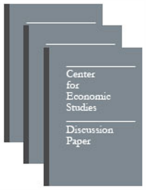The Impact of College Education on Old-Age Mortality: A Study of Marginal Treatment Effects
The Impact of College Education on Old-Age Mortality: A Study of Marginal Treatment Effects
Abstract
Using a newly constructed dataset that links 2000 U.S. Census long-form records to Social Security Administration data files, I evaluate the effect of college education on mortality. In an OLS regression, women and men who have at least some college education have 20% lower mortality rates than those with a high school degree or less. I proceed with an empirical design intended to illuminate the extent to which this relationship is causal, estimating marginal treatment effects (MTEs) using the proximity of the nearest college to individuals' birthplace as an instrument. Results indicate positive selection into college education (in terms of longevity) for both women and men. Selection drives almost all of the mortality gap for women. For men, longevity gains from college attendance are concentrated among individuals with unobserved variables that make them unlikely attend college. This suggests that men who would benefit most from receiving college education in terms of mortality reductions are those who are not attending.
Others in Series
Working Paper
Working Paper
Working Paper




